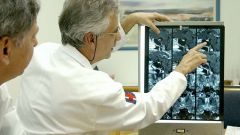Instruction
1
Stage four cancer means that primary tumor has already reached large dimensions, has grown into adjacent organs and, most likely, has metastasized. So even surgical removal of the cancer will not lead to a complete cure. In addition, the patient begins to experience constant pain, suffering from chronic intoxication (as a result of disintegration of tumor tissue), anemia, etc. the Treatment can only be palliative.
2
Palliative care aims to relieve the suffering of the patient, eliminating the painful symptoms, a organization proper care, psychological support of the patient and his family members.
3
Depending on the type and location of the tumor, the application of radiotherapy and chemotherapy. If you allow the condition of the patient and type of cancer, may be offered surgical treatment with partial removal of the cancer. The purpose of therapy is to reduce the primary tumor size and suspend the rate of cell division of cancer cells. If the treatment is effective, the patient becomes easier, and his life is prolonged for several months or even years.
4
Palliative care includes symptomatic treatment, that is, the relief of painful symptoms. To alleviate pain prescribe narcotic analgesics. If you have difficulty breathing, the patient shows oxygen inhalation. Fighting toxicity with intravenous fluids.
5
Surgical care may also be symptomatic. For example, if cancer of the bowel and intestinal obstruction, the patient form a stoma (sutured healthy part of the intestine to the skin of the abdomen), so that the patient could urinate. For throat cancer the patient made an incision in the trachea and insert a breathing tube, so that man could breathe.
6
Ensuring the proper care of cancer patients is an integral part of medical care. Preference is given to hospices. Throughout the civilized world decided to hospitalize severe incurable patients in specific health organizations, which provide qualified assistance and competent care. Patients prevention of pressure ulcers in a timely manner introduced drugs and painkillers, if necessary, prescribe tube feeding. It eases the suffering of the patient and his family members.
7
Psychological support is essential for a dying patient. Psychologists, therapy and individual or family psychotherapy, aimed at reconciliation of the patient and his family with the fact of death. Often prescribed tranquilizers (drugs that reduce fear and anxiety) and antidepressants.







